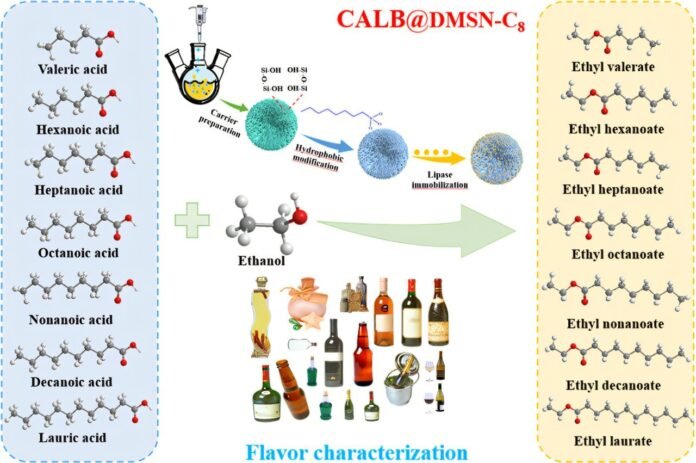
Researchers have developed a highly efficient and reusable biocatalyst with promising applications in the food and cosmetics industries.
The international team, co-led by Newcastle University, developed a cutting-edge method for attaching enzymes to specially designed, sponge-like silica particles. This new system allows for highly efficient, solvent-free production of flavor esters, key ingredients that give food, drinks, and cosmetics their appealing scents and tastes.
Published in the Journal of Agricultural and Food Chemistry, the study tackles key challenges in biocatalysis, achieving exceptional catalytic efficiency, thermal stability, and reusability. Its scientific importance and innovation were recognized with a feature on the journal’s cover.
Study co-author, Dr. Vladimir Zivkovic, Senior Lecturer, School of Engineering, said, “This research marks a significant leap forward in the field of enzyme technology and green chemistry. The ability to achieve such high conversion rates with excellent reusability opens new pathways for industrial applications—from flavor and fragrance synthesis to broader bioprocessing uses.
“It’s especially rewarding to see this work highlighted on the journal cover, and to celebrate the success of a Newcastle alumnus leading such impactful innovation.”
Study co-author, Dr. Kheng-Lim Goh, Associate Professor & Reader in Mechanics of Composite Materials at Newcastle University in Singapore said, “The work showcases how an interdisciplinary approach—combining materials science, biochemical engineering, and computational modeling—can overcome long-standing challenges in enzyme design.
“That it has been featured on the cover of a leading journal is a testament to its importance. And to have it led by a Newcastle graduate is something we are especially proud of. It truly reflects the global reach and relevance of the research culture here.”
This achievement highlights the global impact of Newcastle University’s research and teaching. Lead author Dr. Yi Zhang, who completed both MSc and Ph.D. programs at Newcastle, represents a new generation of scientists driving innovation with real-world applications.
More information:
Run Liu et al, Novel Immobilized Enzyme System Using Hydrophobic Dendritic Mesoporous Silica Nanospheres for Efficient Flavor Ester Production, Journal of Agricultural and Food Chemistry (2025). DOI: 10.1021/acs.jafc.4c12029
Provided by
Newcastle University
Citation:
New enzyme technology to boost flavor production efficiency (2025, July 24)
retrieved 24 July 2025
from https://phys.org/news/2025-07-enzyme-technology-boost-flavor-production.html
This document is subject to copyright. Apart from any fair dealing for the purpose of private study or research, no
part may be reproduced without the written permission. The content is provided for information purposes only.






